Lucca
Live Cases
Live Cases are a real-time journaling process for the Living Lab case studies. Follow along quarterly to learn more about the experiences and lessons learned taking place in the ROBUST Living Labs.
Live Case 4: Proximity and Resilience in Times of Sanitary Emergency
Italy was the first European country to be hit hard by COVID-19 and the first to enact lockdown and mobility restrictions. These were in place from 10 March until 4 May, when the Phase Two began and the most restrictive measures were loosened.
Italy had some of the most stringent lockdown restrictions in Europe, which were especially felt by urban dwellers. City parks and green spaces were closed and people were not allowed to move farther than 200 meters from home. Even stretching one’s legs in the park was unattainable, and the idea of moving to the countryside was beginning to make its way into many people’s mind.
In Tuscany – the home of our Living Lab – the virus’s direct impact was limited, compared to regions in Northern Italy, especially Lombardy. But the aftermath of this pandemic does not leave room for hope that the worst is over.
The Tuscan region relies heavily on tourism (48.5 million nights spent in 2019, increasing by +0.7% compared to 2018) and the 2020 data are bleak. Scenario-based forecasts made by the Regional Institute for Economic Planning of Tuscany (IRPET) show tourism activities decreasing by -38% in the best-case scenario and -67% in the worst-case scenario.
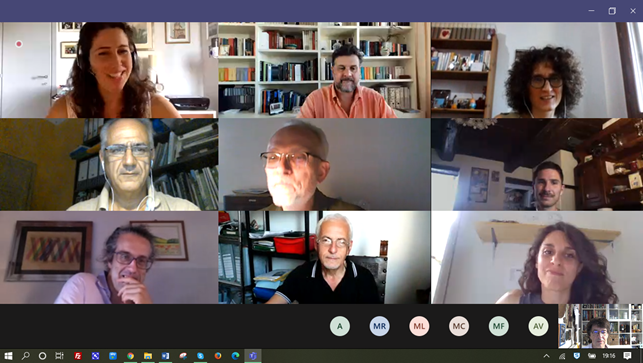
The pandemic has exposed vulnerability in our economies, work systems, healthcare, and lifestyles, while simultaneously highlighting the essentials of our lives, like community, public services, and food.
On the community side, several initiatives were established in the last months throughout Italy to respond to the many needs from the COVID-19 crisis. For instance, food parcels were distributed by volunteers to the most vulnerable groups – from the elderly coping with social isolation to those who lost their jobs – and charities have been collecting spare laptops for children who are otherwise unable to keep up with their school lessons remotely.
In Lucca and Capannori, the recently created Food Policy Council worked to reopen the four farmers’ markets during the lockdown, to provide a market outlet for local farmers to diversify the food supply sources available to residents, and also help to alleviate the long supermarket queues.
Now that we are slowly getting back to “normal”, some of these initiatives will stay in place, while other emergency-led initiatives will be possibly dropped.
But what have we learned from COVID-19? And how could we build on lessons learnt to make better long-term choices?
Being part of the ROBUST project has given us – as both researchers and civil servants – the opportunity to look at these events and responses through the distinctive lens of rural-urban relationships. We were able to work from home and our daily activities were not as disrupted as other less fortunate ones. Collaborative work in the Living Lab had to be rearranged, but everything that was happening convinced us even more that ROBUST’s work is not only timely, but necessary.
We decided to hold the face-to-face regional workshop originally planned in March as three online workshops that focussed on access to land from the perspective of the Intermunicipal Food Policy and Regional Land Bank. A plausible future vision for the Lucca Plain in 2040 was shared with the participants – from Food Policy councillors to farmers’ associations, land use planners, researchers and land owners. They were asked to provide their insights into possible actions that would help fill the gap between the vision and the state of the art, meanwhile depicted by way of available data on land use and agriculture in the Lucca Plain.
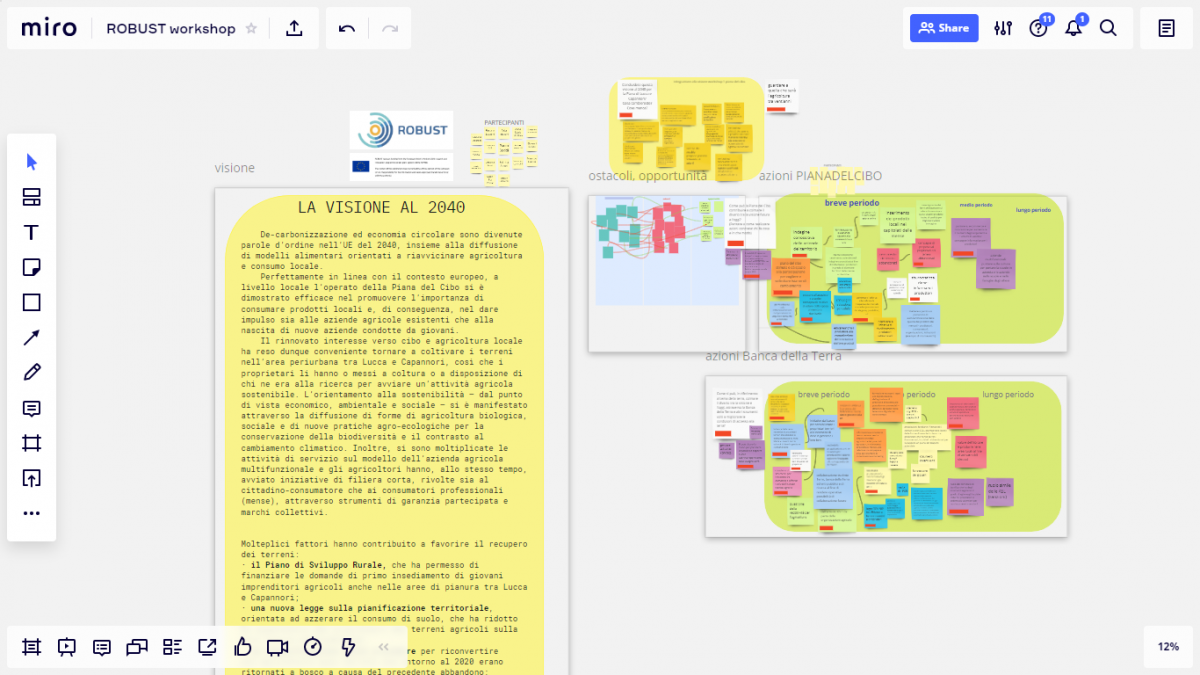
There are two interconnected concepts resonating with our Living Lab activities and purposes that have clearly shown their relevance during the crisis, and will hopefully shape our future action plans as envisaged in the workshops.
The first is proximity. In general, most of the COVID-19-related initiatives have shown how important proximity relationships have become at times of crisis. This should make us all reflect upon what could be still recovered. This is certainly true for rediscovered neighbourhood relationships, as well as the value of the grocery shop down on the street. Activities and practices particularly related to food supply and consumption have gained centre stage public relevance, as well as the availability of public spaces to host them.
As the local Food Policy has been calling for, reorganising the local food system around the needs of people and the territory might provide a good starting point to work towards long-term sustainability, and local authorities play a crucial role in this process.
The other concept is resilience. We understand that a core value for a resilient food system is its diversity: diversity of supply chains, producers, and food – particularly the places our food comes from, including our own city-region.
Data from our Living Lab show that the Lucca Plain includes about 35% abandoned land, and only about one-third of agricultural land is managed by professional farmers. Moreover, most farms are affected by high fragmentation, which increase costs and difficulties for farming activities. This is especially true for young people, who already facing the major obstacles of access to land, while most of this – namely: 500 ha in the past 15 years – is lost to abandonment.
Our LL aims to develop a local food policy and a territorial plan to mitigate urban sprawl, steer synergies between the city and the countryside, and valorise cultural heritage, landscape and territory.
Isn’t it the most suitable time to get back to work?
Live Case 3: Lessons Learned in Lucca for Moving Forward
The 1st ROBUST Regional Workshop was held in the afternoon of the 26th of September in the beautiful Palazzo Ducale, where the Province of Lucca has its headquarters.
The workshop brought together 36 citizens and professionals – farmers, public officials, civil society organisations, representatives of producers’ organisations, etc. – most from the Lucca Plain. The aim of the day was to let local stakeholders share their experiences, discuss good (and not-so-good!) practices of rural-urban interactions through a participatory, guided exercise.

The workshop was structured around the broad theme of “Relationships and interactions between rural and urban. Creating synergies between the city and countryside to promote sustainable food systems, ecosystems and cultural heritage” and activities were divided into two main parts.
During the introductory and more “institutional” session, there were inputs from several key actors: the Chair of the Province gave the inaugural speech, then practitioners and researchers – both external and from ROBUST team – provided insights into the factors currently facilitating and hampering rural-urban relations and illustrated the aims of the day from different perspectives.
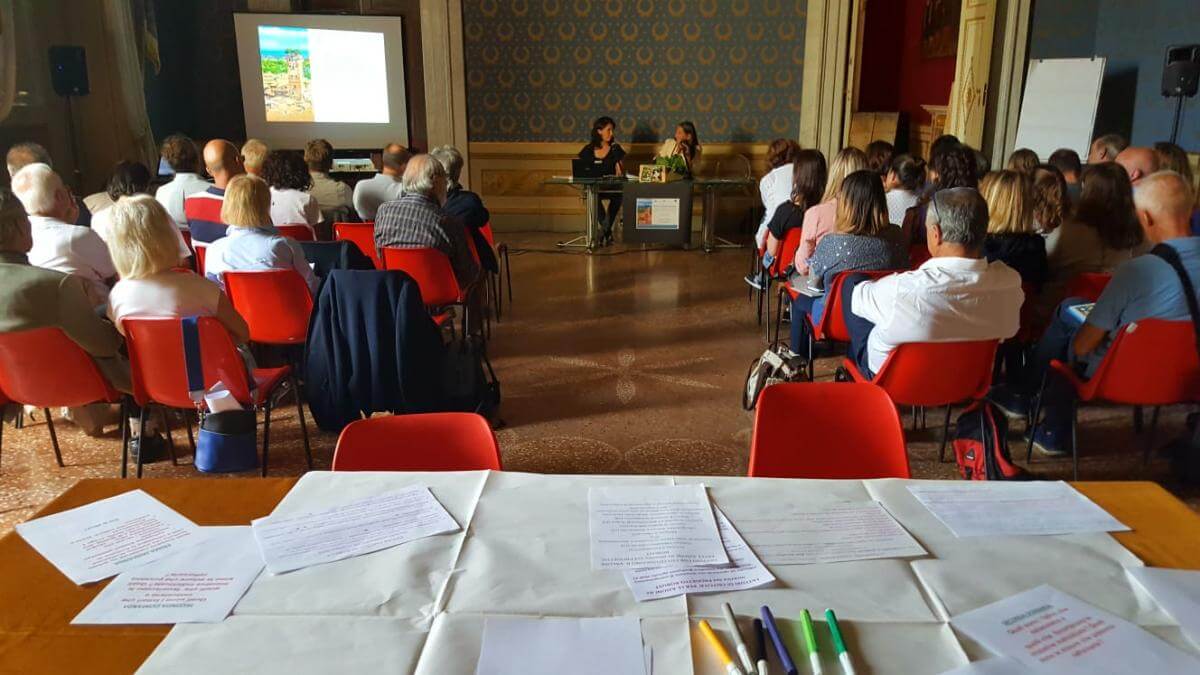
The second part of this half-day workshop involved the active contribution from participants, who worked in groups. Four groups of participants gathered around tables and worked on key questions aimed at identifying initiatives/connections and good practices, relationships in place (or indeed identified by the participants as strongly needed) that exemplify relations between urban and rural territory in the Lucca Plain.
Three thematic areas of reference were suggested to inspire the participants in sharing their perspectives: initiatives concerning the food systems, cultural assets, environment and territory. Hence, for each connection/initiative they were asked to identify the factors that hinder or favour them. It was explained that this work is preliminary to identifying measures of governance/policy that support their implementation or replication.

Feedback from the workshop was positive – especially, participants valued highly the magnificent venue (there aren’t so many opportunities to enter Palazzo Ducale and work in such a place!), and especially the opportunity to network and learn from one another.
We took away three lessons from the workshop:
First, there are significant expectations around the Living Lab activities, which was reflected in the extensive participation of stakeholders. In this regard, it was important to specify during the plenaries that this workshop is one of the steps of a longer ‘pathway’ (also to give a sense of continuity between the activities to be proposed).
Second, we have to carefully consider the challenges in reconciling the needs of the project and the ongoing development of the Living Lab agenda.
Third, at this point, it is necessary to organise events that enable us to go more in-depth on specific governance actions, both concerning the local food policy and the territorial planning
Live Case 2: Living Lab as Synergy Hub
The Envisioning phase of the Lucca LL included participating in, observing and attending a number of public events involving different categories of actors (e.g., farmers, farmers associations, civil society organisations, public officials), individual stakeholder interviews, bilateral meetings (e.g., between Living Lab members and municipality officials) and internal discussions.
As anticipated in the Live Case #1, the Living Lab (LL) has a starting point in CIRCULARIFOOD, a participatory project held during the six months before the official start of the LL in ROBUST. This project involved the five municipalities of the Lucca Plain. CIRCULARIFOOD aimed to involve citizens and local stakeholders in the definition of the Food Plan for the Plain of Lucca.
The Envisioning phase started by understanding the best way to bridge CIRCULARIFOOD with the planned LL activities, in coordination with research and practice partners. This required observing and participating in the final stages of the CIRCULARIFOOD project.
The Intermunicipal Food Council – the first of its kind in Italy – was launched with a public celebration on 23 January 2019 in Capannori. The final document describing the Food Strategy was released on that occasion, and included guiding principles, as well as a set of strategic interest areas and goals for the Food Council:
- Facilitating access to local food for all citizens;
- Fostering knowledge on local food production and consumption;
- Supporting knowledge and education on food and lifestyles;
- Improving local food assistance;
- Setting up common rules;
- Fostering sustainable agriculture.
The five municipalities pledged to adopt the Food Plan 2019-2023 and dedicate resources and competences for its implementation. Most notably, one of the first acts will be to establish a dedicated Food Policy Office for the Lucca Plain. A Food Council will encompass a political component (the Assembly of Mayors) and a public component open to civil society, called Agorà, to recall principles of democracy and participation (participation criteria are open in this starting phase).
Notably, the Food Plan for Lucca has been among the cases presented in January 2019 at the second meeting of the Italian Network for Local Food Policies, where practitioners and researchers shared their knowledge and experience regarding food policy initiatives unfolding in Italy. (The summary report from that meeting can be downloaded here, in Italian.)
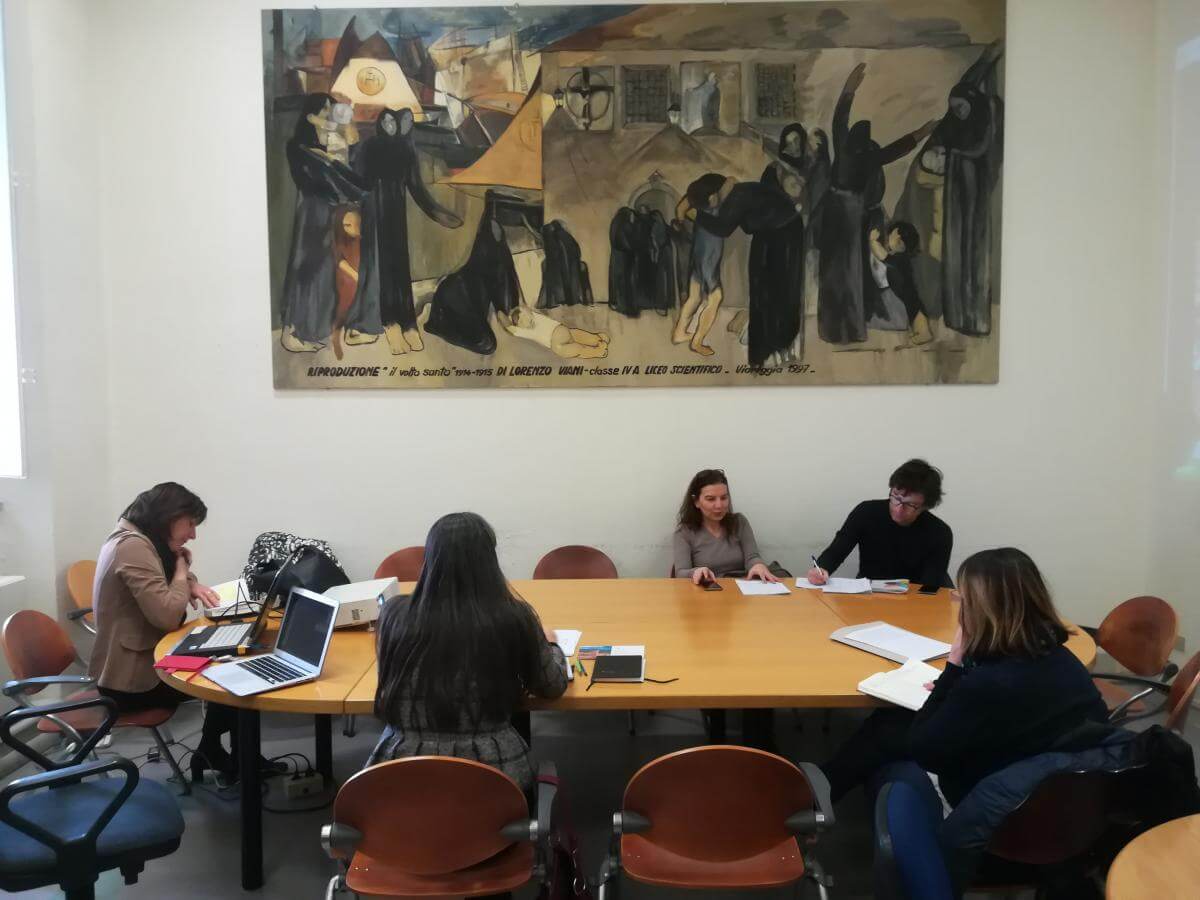
The flexible nature of the LL has revealed two interconnected areas of work that have clearly emerged during the Envisioning phase, and on which ROBUST research and practice teams have agreed upon:
1. Governance of the Inter-municipal Food Policy Plan.
The LL aims to observe and support the governance the development of the Food Policy Plan in the months to come, as a result of the interactions between the stakeholders involved (see below). Activities will include mapping and monitoring projects and initiatives of interest undertaken in the Lucca Plain. These will not necessarily come under the Food Policy Council’s aegis but could potentially share the same principles and thus be included within the Food Policy Plan framework.
The aim is to create and develop synergies with other resources available in the territory. For instance, there is an active community working on sustainable food, agriculture, and food waste topics involving Slow Food, local schools and families. The LL will engage with this community and follow their initiatives, while also carrying out initiatives of awareness raising and information on sustainable agri-food systems, organising spaces for the debate and exchange of experiences that are aimed at putting forth concrete proposals to the Municipalities.
2. Integrating rural-urban connections in land use planning processes.
The LL will also experiment with the ways that food acts as a key to conservation, valorisation and integration of rural-peri urban-urban spaces and functions. In the coming months, land use planners will be involved in the planning process to implement the operational land use plan for the Municipality of Lucca (Piano Operativo), the structural plan for municipalities in the area of the Lucca Plain (Piano Strutturale) and the update of the Territorial Coordination Plan (PTC).
The timely overlapping of these different planning activities will provide planners with the opportunity to realise a more comprehensive and integrated land use planning process. The food policy role – and therefore of the LL – will be crucial for providing support and influencing the planning process by working with public officials, technicians and planners involved in these activities.
In addition, the LL will involve the students of Architectural Engineering and Environmental Science at the University of Pisa. They will develop (by late May-early June) a master plan for the Plain of Lucca, whereby the main strengths, weaknesses and possible intervention strategies and actions will be identified. The students will present their results of the analysis and provide concrete proposals and/or recommendations to local planners at a planned event.
Live Case 1: Experimenting with the Lucca Food Pla(i)n
Urban sprawl has been on the rise in the Plain of Lucca in the last decades. The same holds true for the abandonment of agricultural land and the loss of local entrepreneurial fabric linked to agriculture. Among the environmental, social and economic outcomes of such trends, the provision of ecosystem services is likely to be seriously undermined and deserves our attention – especially in the face of climate change.
But how do we give prominence to peri-urban areas? How do we communicate the importance of synergies and interdependencies between rural and urban? What would the Plain of Lucca look like if such rural-urban linkages were highlighted?
The Lucca Living Lab aims to identify a governance model that allows such interconnections to be explored and highlighted. Local food becomes the keystone in making rural-urban synergies prominent.
The idea underpinning our Living Lab is to make the local food system take on a central role in ensuring the adequate conservation and enhancement of rural territory in the Lucca Plain. With this purpose, the Lucca Living Lab will act upon:
- sustainable food systems, for the design and operationalisation of a food system model which will foster the environmental, social and economic sustainability of the territory;
- cultural connections, that is, on the values and meanings attached to local food, as well as knowledge and traditions related to local food, rural architecture and landscapes, to foster the demand for good local food and sustainable tourism;
- ecosystem services, towards innovative solutions for the maintenance of cultivated land and for the reproduction of multiple functions which both rural and urban areas and their dwellers will reap the benefits from.
Our Living Lab will build upon – and depart from – the results of the previous (almost complete) project CirculariFood: the Food Plan and Food Policy Council. The Food Plan will include, in addition to a Charter of Principles, a set of actions that adhering municipalities will be called on to implement. The Food Policy Council is the “control room” from which the Food Plan is run.
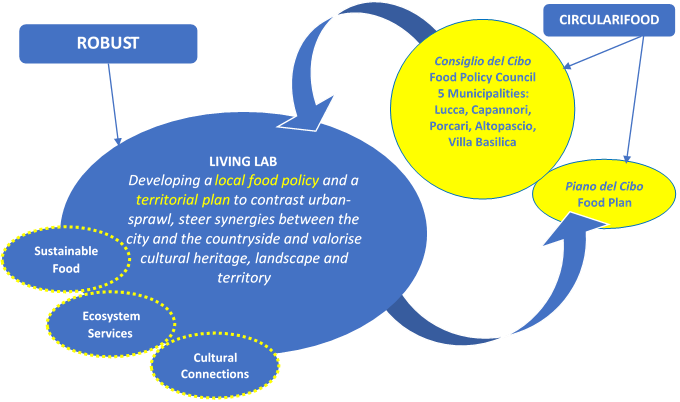
The shape the Food Policy Council will take is open to experimentation within the Living Lab. The level of experimentation will likely depend on different stakeholders’ involvement and the Living Lab’s forthcoming initiatives. The Lucca Living Lab will therefore provide the Plain of Lucca with plenty of opportunities to:
- guide the experimentation of the Food Policy Plan and Food Policy Council, testing the future governance arrangements and emerging solutions in real-time;
- set up a space where lots of different actors who are unaccustomed to working together can cooperate; and
- create an arena of knowledge exchange and collective reflection upon ROBUST central themes.